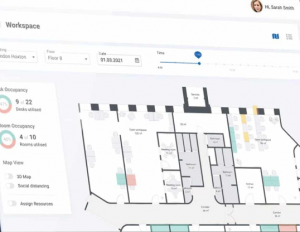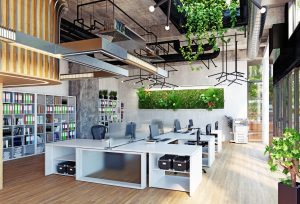Hoteling Allows For More Flexible, Optimised Workspaces
Many organisations are turning to hoteling and hot desking. Read on to find out how they facilitate flexible work!
Hoteling facilitates flexible work, saves costs and optimises workspace

Many organisations are incorporating hoteling and hot desking to their workplaces as hybrid work and remote work become part and parcel of the modern work culture.
The origins of hoteling and hot desking can be traced back to the working of big companies — requiring employees to travel to other locations for work.
Companies like Google, Microsoft and Amazon have incorporated hoteling to utilise workspaces, which remained unoccupied as employees travelled elsewhere for work.
This change in the workplace has brought with it more autonomy and flexibility for workers, who, in turn, use this new-found freedom to add value to their work.
Any change requires persistent efforts, awareness, and willingness to break the mould.
Credit, of course, is due to hundreds of thousands of employees and their employers across the globe for making different work models work.
How do we define hoteling?
Hoteling means reserving a workspace for a few hours or a few days — quite like reserving a hotel room for a stay.
Employees of an organisation can reserve a publicly shared workspace or an office workstation on a need-to-use basis.
What is hoteling and how it works can be understood easily by looking at the workplace requirements of an organisation whose employees regularly travel for work — or engage in hybrid working.

What is Hybrid Working?
An employee of an organisation is on hybrid work when they work partly in the office and partly from home or any place other than the normal office environment.
This example will also distinguish hoteling in a public workspace from what is hoteling in an office.
Employees of organisations travelling for official work can reserve public workspaces as and when needed.
Meanwhile, employees on a hybrid work model can reserve office workspace on days they are required to attend the office for a specific number of hours.
Hoteling software can detail which desk or meeting room is occupied for how long and when it will be free for use for another employee.
Today, companies are not required to permanently keep a workstation for employees who travel to other locations for work.
Hoteling makes it possible for owners to use their workspace smartly and alternate a workstation between employees according to their needs.
That way, companies can utilise their workspace efficiently and cut costs on renting more space than they actually need.
In an attempt to define hoteling, many people confuse it with hot desking, which is a different concept.
What is a hot desk or hot desking?
A hot desk or hot desking makes it possible for the employees of an organisation to sit and work from any desk within their workplace.
Employees don’t have specific workspaces marked for them and can opt to sit at any workstation they like when they come in.
Facilitated by workstation booking systems, an employee needing to put their head down for more focused work can opt for a quiet corner away from other staff who are required to communicate more as part of their role.
Someone in love with the idea of sitting beside the window with a view can avail of it by using their company’s space management software.

Advantages of hoteling in an office & hot desking
When done right with careful considerations to the workspace design, communication, and collaboration, hoteling and hot desking has benefits for both employees and employers:
- Reserving workspaces makes space available for break-out areas
- Saves money on having extra workstations
- Facilitates collaboration among different departments
- Facilitates hybrid working
- Gives employees a better perspective of others work
- Fosters new friendships and increases productivity
- Optimising workspaces can lower real estate costs
How does hoteling work in the workplace?

A number of office space hoteling solutions can function independently or integrate with a company’s systems.
The success of a hoteling system depends on how easily workers can reserve a workspace and access office information.
Software solutions such as UMA use sensors to know when a desk is occupied – even if it has not been booked
Hoteling software can also facilitate a number of different functions, including -Resource scheduling, desk booking, car park scheduling, occupancy data, guest and visitor management
Design, culture & creativity
From cubicles to office cabins running in rows, office designs have undergone significant transformations to suit the employees’ needs and increase their productivity.
A bad design will result in a stultifying environment, which, in turn, restricts creativity
Introducing hoteling or hot desking at your office space requires a lot of careful planning.
Workspace experts say the design of the office space should be built around an employees work and vary by company and department.
Today, where workers demand autonomy and flexibility to work from home, employers might want to think about turning offices into spaces where employees would prefer to spend time in to perform their work.
In a study of 90,000 people from 155 companies, Gensler reported that individual focus was the most crucial factor in an employee’s effectiveness.
Majority of office designs show that organisations do not focus on facilitating individuals to improve productivity or creativity.

Making hoteling and hot desking work
In addition to all the factors discussed above, figuring out the correct software and hardware is crucial to the success of your organisation.
ISDM experts take into account space available, current utilisation of space, budget, number of employees and nature of work before helping you set up hoteling and hot desking facilities for a smooth sailing.



